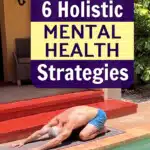Mental health is a vital aspect of your overall wellness. And that’s an understatement.
This article reveals six tips to help your mind reach a new level of wholeness and vigor so you can experience more joy and more success in life.
A video is also included for an extra boost of motivation.
Thrive Beyond Meds: 6 Holistic Strategies for Mental Wellness
Don’t let your mind hold you back.
You can prioritize mental wellness in order to live a more fulfilling life.
It’s tempting to think that health is just physical. But to truly thrive in life, you must have profound mental well-being. And yet, it’s so easy to overlook this crucial component of your healthiness.
Fortunately, holistic mental health strategies provide proven solutions for improving your mind – beyond traditional psychiatric treatments.
Of course, modern psychiatric medicines are a blessing for many mental health challenges. However, they aren’t always necessary. And even when they are, they’re often more effective when used in conjunction with other self-care techniques.
A meta-analysis compared the efficacy of pharmacological, psychological, and combined treatments for anxiety disorders. It found that medications generally had slightly higher effectiveness than psychotherapies alone; however, the combination of cognitive behavioral therapy (CBT) and medication showed significant efficacy, suggesting a combined approach might offer better outcomes for patients with anxiety.
Another recent study has established that talk therapy and art therapy can be helpful (when compared to non-active control groups) with other disorders, too, including those related to personality afflictions – such as lack of empathy, lack of accurate self-awareness, habitual mood swings, rage, arrogance, or lack of remorse.
Finally, Researchers from the University of Michigan and Harvard University found that over five years, the benefits and costs of antidepressants and talk therapy even out for individuals with new diagnoses of major depression. Initially, antidepressants may seem more cost-effective due to lower immediate costs. However, considering the long-term effectiveness and the potential need for patients to switch medications or deal with relapses, both treatment approaches show similar value in the long run.
With that in mind, here are non-medicinal self-care techniques you might consider:
1. Laugh, Love, Thrive: Know that You Deserve Excellent Mental Health
The first strategy for improving your mental health holistically is for you to consciously decide that you want an even healthier mind and that you are worth having it.
The health of your mind influences how you think, feel, and behave.
Your mental health is also intricately linked with your physical health. Just as physical fitness helps you stay resilient, good mental health enhances your resilience to stress, contributes to your happiness, and allows you to engage in life fully.

Mental health is a state of well-being in which you recognize, engage, and grow your own abilities.
When you have good mental wellness, you’re coping successfully with the everyday stresses of life and can work productively and fruitfully.
An additional big benefit of good mental health is that it helps you positively contribute to your community, your loved ones, and the world at large.
This, in turn, can create a deep feeling of satisfaction and accomplishment.
Mental health significantly impacts your cognitive function, which includes your ability to concentrate, make decisions, and interact effectively with others. It also influences your ability to learn, adapt to change, and cope with life’s ups and downs.
“There is only allowing or resisting, letting in or keeping out the abundance that you deserve.
As you gradually train your own thoughts into those of positive expectation, as you align with thoughts of worthiness… as you align with your true power by seeking good-feeling thoughts – you will no longer offer resistance to your own abundance.
And when your resistance stops, your abundance will come. A flood of good-feeling ideas and possibilities will flow to you. Opportunities and propositions will be plentiful.
And soon you will stand in knowing amusement that all of this was always there within your reach, but in your resistant state, you were not yet able to experience it . . . but then, it came – not because of your struggle but because of your ease.”
– Abraham-Hicks
Good mental health also promotes emotional well-being, enabling you to experience and express a full range of emotions, build and maintain healthy relationships, and deal effectively with conflict.
Take the first step to transform your mental health by consciously deciding now that you deserve to have an even healthier, happier mind.
2. A Paradigm Shift: Choose to See Mental Health More Holistically
The second step for improving your mental health is to consciously decide that health is about more than just the condition of your physical body and – instead – to adopt a more holistic perspective that encompasses you as a whole person — mind, body, and soul.
Because, as the understanding of mental health has evolved, it has been established that achieving mental wellness involves more than merely addressing any surface symptoms you might have.
This approach recognizes that your emotional, psychological, and social health is influenced by many factors – including nutrition, lifestyle, physical activity, relationships, and spiritual well-being.
The holistic approach to a healthier mind is gaining traction as it seeks to integrate traditional therapeutic methods with complementary and alternative treatments.
It’s a paradigm shift, moving away from a symptom-focused model to one that is person-centered, emphasizing balance and interconnectedness:
- Research supports the efficacy of this approach. For instance, a study published in the “Journal of Holistic Nursing” found that holistic interventions can effectively reduce anxiety, depression, and stress levels.
- Similarly, a report in “Global Advances in Health and Medicine” confirmed the beneficial impact of mind-body practices on mental health.

You can recognize the multifaceted nature of mental health – acknowledging the intricate interplay between psychological processes, biological makeup, sociocultural environment, and spiritual beliefs.
This paradigm shift to enhancing your mental health can involve simply opening your mind a bit further to the power of basic activities like mindfulness, healthy eating, physical movement, natural supplements, therapeutic massage, or talk therapy.
Although synthetic pharmacological prescriptions can be helpful in certain circumstances, the second strategy is to recognize that abundant solutions exist to improve your mental health – beyond just meds.
3. Improve Your Mental Wellness with Better Nutrition
Emerging evidence suggests a strong link between what you eat and mental health.
The foods you consume can significantly influence your brain chemistry, mood, and cognition.
Essential nutrients like omega-3 fatty acids, B vitamins, and antioxidants help maintain brain health and reduce the risk of mental disorders.
A Mediterranean-style diet rich in vegetables, lean proteins, and healthy fats is beneficial in managing mental health conditions like depression and anxiety.
Likewise, certain probiotics, often called ‘psychobiotics,’ are also gaining recognition for their potential for mental health improvement. They influence the gut-brain axis, a bidirectional communication system between the gastrointestinal and nervous systems, impacting mood and behavior.
4. Incorporate Physical Activity More Consistently into Your Week
Physical activity is a potent ally for mental wellness.
Regular workouts release endorphins, the body’s natural mood boosters, improving mood, reducing stress and anxiety, and even mitigating symptoms of depression.
It can also enhance sleep quality, boost self-esteem, and improve cognitive function.
The type of exercise may vary from person to person. Some may find solace in the rhythmic movements of yoga or tai chi, while others might prefer the intensity of running or weight training.
The key is regularity and enjoyment in the activity. Creating a sustainable exercise routine contributes to mental health and overall wellness.
5. Nurture Relationships and Social Connections to Up Your Wellness
Humans are social beings. Relationships and connections with others can significantly influence your mind’s health:
- Positive relationships can provide a support system, help manage stress, and foster a sense of belonging and acceptance.
- Conversely, social isolation or toxic relationships can lead to or exacerbate mental health problems.

Strategies to enhance social health might include setting healthy boundaries, improving communication skills, seeking and providing social support, and engaging in social activities.
Volunteer work or community involvement can also provide a sense of purpose and improve mental health.
“Talk therapy can be a powerful tool for transformation. It allows individuals to explore their thoughts, feelings, and behaviors in a safe and supportive environment. Through this process, they can gain insights into their patterns, develop new coping strategies, and foster a deeper understanding of themselves and their relationships. Psychotherapy can lead to significant improvements in mental health, enhancing a person’s ability to manage stress, overcome challenges, and lead a more fulfilling life.”
–Dr. Aaron T. Beck, renowned psychiatrist and the father of cognitive therapy.
If you’re an introvert who has become more isolated as the years pass (it’s a common phenomenon in today’s digital world), you might need to start small:
- Go to a cafe and simply be around people, even if there is little direct interaction.
- Or enroll in support-group therapy or find a 12-step meeting that is a good match.
- You can start out mostly listening to others, and then – over time as you get more comfortable with the surroundings – you can begin to share.
6. Leverage Mindfulness and Meditation toward Better Mental Health
Mindfulness and meditation practices have a long history of promoting mental wellness. They foster an increased awareness of your thoughts, feelings, and bodily sensations, helping you stay present rather than ruminating over the past or worrying about the future.
These practices can lower stress levels, enhance emotional regulation, and improve focus and creativity.
Many mindfulness-based interventions, like mindfulness-based stress reduction (MBSR) and mindfulness-based cognitive therapy (MBCT), have effectively managed conditions like anxiety and depression. Weekly yoga and deep breathing sessions have also been helpful for many people.
Conclusion on Embracing Wellness Holistically
While psychiatric medications provide relief for many, building mental resilience often requires a holistic approach.
Self-care skills and community support enable people to taper medications or use lower doses more comfortably.
With the right tools, you might be able to work toward lasting well-being with or without prescriptions, but it’s wise to consult with your medical doctor or therapist to determine what specific treatments are indicated in your situation.
Holistic strategies offer a comprehensive approach to mental wellness, recognizing the unique complexity of each individual.
The strategies shared here can empower you to take charge of your mental health by adopting a lifestyle that nourishes your mind, body, and spirit.
As the evidence base for these strategies grows, it’s hoped that more people will incorporate them into their wellness journey. Of course, it’s an excellent idea to consult your doctor or licensed counselor if you’re experiencing depression, anxiety, PTSD, or mental health challenges. And do keep in mind that 75% of people who enter psychotherapy benefit from it.
Embracing wellness holistically does not mean disregarding traditional mental health treatments.
Instead, it’s about complementing them with lifestyle modifications and alternative therapies.
It encourages a collaborative treatment approach involving the individual, healthcare providers, and often, the community in the pursuit of mental well-being.
As you navigate the complexities of modern life, remember that your mind is just as important as your physical health.
It’s wise to view them not as separate entities but as interdependent aspects of your overall well-being.
Embrace wellness with holistic mental health strategies and experience the transformative effect it can have on your life.
Additional Resources:
Existential and Spiritual Needs in the Care of the Mind – https://citeseerx.ist.psu.edu/document?repid=rep1&type=pdf&doi=905932e7dee0a768009a06b9afe772ccb612093b
Abraham-Hicks Synopsis of Principles – https://www.abraham-hicks.com/about/
Approaches by Holistic Nurses – https://www.ahna.org/American-Holistic-Nurses-Association/Resources/Holistic-Mental-Health
Results in Mind-Body Skills Programs – https://journals.sagepub.com/doi/full/10.1177/2164956120973983
The What, How, and Why of Psychotherapy – https://www.psychiatry.org/patients-families/psychotherapy
